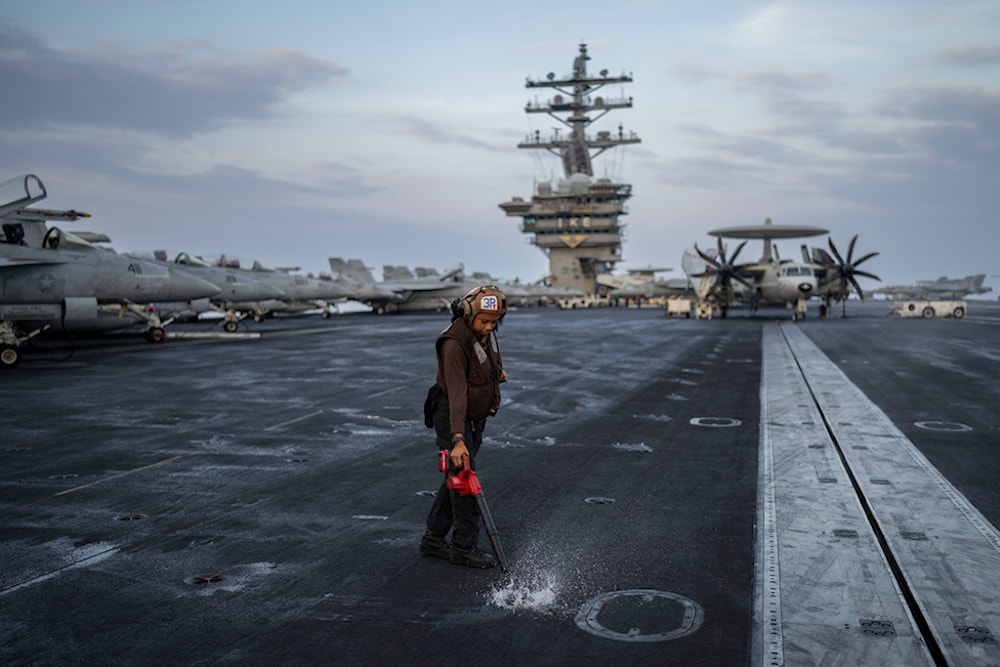EU needs more warships in Red Sea to match Yemen's power
The commander of the EU's Aspides has revealed that the naval mission lacks warships that could attempt to counter the Yemeni's operations.
-

A crew member does maintenance work on the deck of the U.S.S. aircraft carrier Dwight D. Eisenhower, also known as the 'IKE', on the south Red Sea, Tuesday, Feb. 13, 2024 (AP)
The European Union's Aspides naval mission in the Red Sea lacks the warship power needed to protect ships heading to "Israel", or affiliated with the occupation, from the Yemeni Armed Forces' operations, the commander of the operation reportedly stated in Brussels.
German media revealed, citing Admiral Vasileios Gryparis of Greece, that the naval operation only had three warships left in the Red Sea, following the withdrawal of the German Hessen frigate.
Germany's Hessen retreated from the Red Sea on April 20 and arrived at Wilhelmshaven port in northern Germany on Sunday. However, the Defense Ministry stated that a ship rotation is underway, with the Hamburg frigate set to sail to the Red Sea in August.
Gryparis claimed that Aspides was able to defy the Yemeni's military operations, alleging that 96 commercial ships were successfully protected throughout their passage in the Red Sea, while 12 Yemeni drones were intercepted.
The EU's naval operation, however, experienced a short-lived and trivial "success", amid the absence of warships and the steadfast Yemeni defenses which have been able to overwhelm Aspides' air defenses, leaving them vulnerable to any operation.
Consequently, Gryparis stated that at least 10 warships would be required to escort commercial ships safely across the Bab al-Mandab Strait.
Read more: Red Sea rising: Exposing the West's diminishing naval power
Loss in, loss out for the collective West
This comes amid the withdrawal of USS Dwight D. Eisenhower and USS Gravely, which successfully transited the Suez Canal, after nearly four months stationed in the Red Sea, the Navy announced last week.
During its stay in the Red Sea, the US battle group failed to halt Yemeni operations against maritime navigation linked to the Israeli regime as operations continued.
The Yemeni Ansar Allah movement simultaneously revealed that it is working on reinforcing the country's reach toward the Indian Ocean, seeking to cut off the Israeli-affiliated ships from sailing on the Cape of Good Hope route or toward the Red Sea, according to Sayyed Abdul-Malik al-Houthi.
The Yemeni front will remain open and the YAF operations in support of Palestine will continue, Sayyed al-Houthi stressed during a speech in which he addressed the latest regional developments.
The leader of the Ansar Allah movement emphasized that the expansion of the YAF's operations into the Indian Ocean was never taken into account by American, British, and Israeli authorities, or what Sayyed al-Houthi refers to as the "Triad of Evil."
Initially, Yemen's military began supporting the Palestinian people and their Resistance by targeting Israeli occupation forces in long-range attacks, via barrages of ballistic missiles, cruise missiles, and one-way attack drones.
However, answering the directives of Sayyed al-Houthi and the calls of the people of Yemen who participated in weekly million-man marches, the YAF expanded its operations to target Israeli-affiliated ships in the Red Sea and Arabian Sea, a critical maritime route. This led to detrimental effects on Israeli maritime operations, nearly putting the Israeli-occupied Eilat port out of business.

 3 Min Read
3 Min Read








